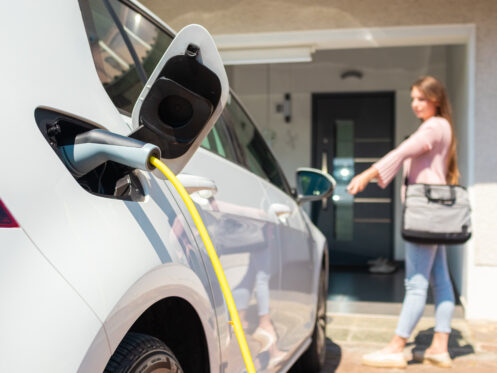Many Floridians are making the exciting move to either a hybrid or electric vehicle. That means lower fuel costs and the convenience of charging it at home. Of course, that requires having an EV charging station installed. Let’s explore everything you should know about EV charging stations.
Professional Installation
While it may not be a legal requirement, experts highly recommend that an EV charging station be installed by a licensed electrician. There is a dangerous component to an EV charger installation, and mistakes can lead to serious injuries or even death. A permit is required, and installation needs to pass inspection by your local jurisdiction.
You should also note that there may be additional costs beyond the charging station itself. If you live in an older home, you may require an electrical panel upgrade. Even in a newer home, you may need the electrician to install a dedicated circuit and perhaps a plug for the charger.
Indoor vs. Outdoor Installation
If you have the option, experts generally recommend an indoor installation, such as in your garage. Outdoor installations are viable, but there are some additional considerations. The equipment costs will be higher because you’ll need a unit that can withstand the added heat, humidity, and rain. You’ll also need a locking mechanism, which is an additional cost. This is to ensure that children and animals cannot harm themselves.
Hard-Wired vs. Portable Charging Stations
Hard-wired charging stations don’t connect to a plug. The line runs directly into the electrical panel. This approach provides more consistent charging and is less prone to surges. Still, you may opt for a mobile charger if you plan to move from your current home soon. You can take it with you more easily. Mobile chargers are also nice because you can take them on trips.
Level 1, Level 2, and Level 3 Charging
There are three levels of EV charging. Level 3, also called DC fast charging, is by far the fastest. That said, it isn’t practical for the home because you’d need an industrial electrical connection. Level 2 chargers are the most prevalent choice for home use. They require a 240-volt electrical connection and typically allow you to charge your vehicle from a low level to 100% overnight. All EVs on the market support Level 2. Most hybrid vehicles on the market now support it as well because it’s much faster.
Level 1 chargers are the slowest option and require a 120-volt connection. They’re suitable for hybrids that have small batteries. They can be acceptable in scenarios where you’re just topping off an EV. Level 1 chargers aren’t practical for heavier usage because it can take 48 hours or more to charge an EV fully. Experts highly recommend a Level 2 charger. Even if you have a hybrid that only supports Level 1, the added cost is worth it. The Level 2 charger will handle Level 1 charging fine, and you’ll have a more affordable upgrade path.
J Plug and Tesla Plug
There are two main plug types used in the U.S. Most EVs use the J1772 connection or J Plug. The Tesla plug is a proprietary connection, but it isn’t exclusive to Tesla. General Motors announced it will use it for its entire family of vehicles by 2025. Experts recommend choosing whichever plug your current vehicle supports. You can always add an adapter later. Some adapters let the J Plug charge Tesla vehicles, while others let the Tesla Plug charge vehicles with a J Plug. If you opt for a dual EV charger, you even have the option of the J Plug on one cable and the Tesla plug on the other.
Charging Your Vehicle Unattended
A common concern among new EV owners is whether you can leave the charging unattended. The answer is yes. It’s safe. The general rule is to monitor it for a couple of minutes. If there aren’t any issues, you can leave it unattended. It also helps to have an app through which you can monitor the charging.
Would You Like to Install an EV Charger in Plantation?
Paragon Electric has more than two decades of industry experience. Our company serves residential, commercial, and industrial customers throughout Plantation and the surrounding areas. We perform inspections and replace and upgrade electrical panels. Our team also specializes in whole-site rewiring, surge protection, outlets, indoor and outdoor lighting, appliance hookups, and much more. Contact us today to set up a service appointment or on-site consultation.



